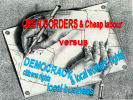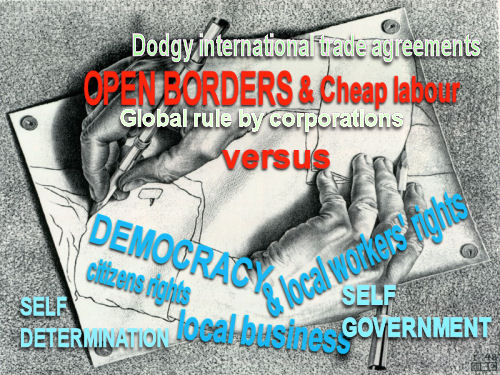Guardian article pushes right wing line of open borders for immigrant labour and Naomi Klein's new book on climate change
 Migration is hardly a solution to world poverty and conflict, but the mainstream media predictably push this line. Even the Guardian, for all its purported democratic values, continuously pushes for open borders without disclosing that these also facilitate a right-wing agenda for cheap imported labour sources and the crushing of local industry and employment. Its recently issued 'special report' entitled, "Hardline Australia, confused Scandinavia and tense Russia: the global immigration picture" http://www.theguardian.com/world/2014/nov/30/hardline-australia-confused-scandinavia-and-tense-russia-the-global-immigration-picture has been described as 'an appalling, if predictable, piece of propaganda."
Migration is hardly a solution to world poverty and conflict, but the mainstream media predictably push this line. Even the Guardian, for all its purported democratic values, continuously pushes for open borders without disclosing that these also facilitate a right-wing agenda for cheap imported labour sources and the crushing of local industry and employment. Its recently issued 'special report' entitled, "Hardline Australia, confused Scandinavia and tense Russia: the global immigration picture" http://www.theguardian.com/world/2014/nov/30/hardline-australia-confused-scandinavia-and-tense-russia-the-global-immigration-picture has been described as 'an appalling, if predictable, piece of propaganda."

An appalling, if predictable, piece of propaganda from the Guardian.
Dr Jane Sullivan, of Sustainable Population Australia, writes
"The idea that immigrants actually might have a negative impact on native people is completely rejected, so that any ill-feeling is attributed to racism and far-right neo-nazi manipulation of the great unwashed (who are too lazy to do the work that the immigrants are doing).
No mention of population pressure at all - not in what is causing them to move, nor in the concerns of receiving countries. All immigrants are saints, all native people who don't welcome them with open arms are facists.
When the Guardian does actually refer to the size of the immigration flows, it is full of inconsistencies - China's welcoming attitude to immigrants is contrasted with the UK's meanness, having just said that China has only given 5,000 permanent residency visas since 1980!
Spain is claimed to have had a net exodus since 2010, but they give the figure of (positive) 600,000 as its net immigration for 2010-2014. The massive inflow to Spain, adding 10% to its population between 1999 and 2009, is not connected by the Guardian in any way with the massive unemployment now driving them away.
The Guardian makes a big thing of how silly it is for the Spanish to resist immigration when they have more people leaving than coming (if in fact they do), but completely rejects any idea that the Scandinavians or Australians might have justification given their high net inflow."
As for the piece on Australia, apart from greatly understating the size of our net immigration (it's been well over a million in the past 5 years, but they say 750,000), the author chides that the conversation is all about refugees and ignores the bulk of immigration, then proceeds to talk only about refugees and ignore the rest of our immigration.
Naomi Klein in This Changes Everything - good work but confusion persists
The same Guardian incoherence is to be found in the otherwise superb works of another Guardian writer and author, Naomi Klein. She writes in This Changes everything, Penguin, 2014, how international trade laws have effectively destroyed local employment and manufacturing initiatives, yet campaigns for open borders.
"One of the key provisions in almost all free trade agreements involves something called 'national treatment', which requires governments to make no distinction between goods produced by local companies and goods produced by foreign firms outside their borders. Indeed, favoring local industry constitutes illegal 'discrimination.' This was a flashpoint in the free trade wars back in the 1990s, precisely because these restrictions effectively prevent governments from doing what Ontario was trying to do: create jobs by requiring the sourcing of local goods as a condition of government support. This was just one of the many fateful battles that progressives lost in those years."
Naomi writes specifically about the contradictory impact of globalism on efforts to combat climate change, which she recognises as needing to be locally based. She is however unable or finds it unwise to criticise the same contradictions when it comes to citizens' rights to self-determination. It seems that where she comes from you can only tell so much of the truth - or perhaps this is mainly due to ignorance. After all, she has only just begun to realise how important our biophysical environment is. She can see how economic ideology conflicts with environmental health but she hasn't worked out how the politics of open borders conflict with democracy and citizens' rights.
On the issue of immigration, whilst she is vocal on Australia's treatment of asylum seekers, she apparently knows nothing of Australia's intake of vast numbers of planned invited economic immigrants in the context of changes to Australian industrial law, which now make immigrant workers a threat to local workers. Nor of how the issue of asylum seekers has been used as a wedge to prevent sensible discussion of population numbers.
"We drive down wages, ship jobs overseas, destroy worker protections, hollow out local economies, then wonder why people can't afford to shop as much as they used to. We offer those failed shoppers subprime mortgages instead of steady jobs and then wonder why no one foresaw that a system built on bad debts would collapse."
Whilst she talks about indigenous groups using their land-rights to fight against fracking and other carbon emitting processes, she also barracks for more open borders, which is antithetical to the survival of indigenous peoples and land, which is defined endogamously and territorially. She also uncritically endorses internationalist corporate 'environmental organisations' because they are 'large'. The ones she cites are known for their business models and to prioritise open borders over democracy, the conservation of natural ecologies and local self-determination - just like the capitalist globalist deregulators. It seems that, in this case, the author of No Logo, Picador, 1999, cannot tell the difference between brand names and actual products.
"As we will see, communities trying to stop dangerous oil pipelines or natural gas fracking are building powerful new alliances with Indigenous peoples whose territories are also at risk from these activities. And several large environmental organizations in the U.S. - including Greenpeace, the Sierra Club, the BlueGreen Alliance, and 350.org took stands in support of demands for comprehensive reform of the U.S. immigration system, in part because migration is increasingly linked to climate and also because members of immigrant communities are often prevented from defending thesmelves against heightened environmental risk since doing so could lead to incarceration or deportation."
Klein's work in This Changes Everything should not, of course, be dismissed for these failings. It is another great contribution to critical political literature.

Recent comments